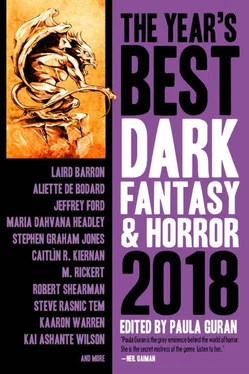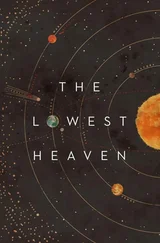There, alone in the field, William buries his new shoes and a plate from the kitchen and a pair of mismatched earrings that he took from his mother’s dresser. Nothing comes of these. When William tries to dig them back up, they are gone. He is more careful now, about what he offers to the field. He only wants to give something that will give him something in return.
The crowd that has been visiting the field every morning is growing restless. They’ve stopped taking pictures. They’ve stopped bringing their friends. Maybe they’re wondering if the field was special after all, or if it was all a mistake. Misty’s mother says the crowd will find something new to be excited about soon, and that scares William, the thought of things going back to the way they were. So maybe, if William buries the right object, then the right statue would grow, and Misty would love it, and his mother would love it, too. They would have dinner on the back porch, the three of them, together, and they would listen to the crickets trembling in the grass and they would say how beautiful the statues were. Their delicate bodies and glowing edges. Like angels, winged and glorious. Like God. And then William could tell them about burying the bottle, how it had been him all along.
William wants to show Misty something. He has been thinking about the right way to do it for a while now. It can’t be raining outside and Penny can’t be there and neither can their mothers, and it has to be before dinner, too. All these things are important. He thinks for days and every time he thinks about it, it makes the palms of his hands itch like they can already feel it, like the William from four days from now is telling him it is all right to do this.
William takes Misty to the barn again. He swept the floor the day before and the barn smells like damp hay and leaves. It isn’t a bad smell.
“I want to show you something,” he says. William lies down on the ground and tells Misty to lie down beside him.
“Why?”
“Because,” he says. “That’s how it works.”
Misty pushes her hand into her back pocket and pulls out a handful of firecrackers. “Why can’t we just light these?”
“This is better.”
“You want me to go get a bottle?”
“No. Lay down.” And, when she still doesn’t listen, William says, “If you don’t want to play, then go on home.”
Then he closes his eyes and lets the sun turn his eyelids bright red. When Misty lays down, he tells her to close her eyes, too. He tells her about the tattoos on his mother’s boyfriend’s back. How the boyfriend plays with the hem of her shorts. How he comes up behind her and puts his mouth on her neck. William rolls onto his side and leans over Misty. He talks the whole time that he is pushing at the button on her shorts. He talks about black ink bleeding into blue ink, about wings on things that shouldn’t have wings, about green light and bodies made of glass. William only stops talking once he rests his hand between Misty’s legs. He moves his fingers back and forth to feel the skin beneath her underwear shift and give. They lie there, side by side on the dirt, waiting for something to happen.
William tears a soft piece of wood from the barn’s door. He plants that, too.
In the morning, there is a new statue. This one is shorter than the glass man, though much wider. This statue is a handmade of gold—five fingers and an unlined palm. The fingers curl gently toward each other. The index and thumb almost meet, like there is something the hand means to take hold of, something that William can’t see, or can’t see yet.
“It kinda looks like me,” William says.
They are on the porch together, William and his mother. There is a small mirror balanced on the rail and Shannon is bent double in front of it. She has one eye closed as she puts on mascara. She is wearing a dress that ties around her neck. William can see the skin between her shoulders, the way it moves, bunching and releasing. She makes a low sound in her throat, a skeptical sound, like when William wakes up late for school and tells her that his stomach hurts, he has a fever, his tongue is a boulder that could weigh the world down, and he can’t imagine going to school today. Not like this.
He says, “It does. Just look at the nose.” He touches his own nose, flattens it into his cheeks. “And my head. The little lump on the side of it.” He touches this, too.
“Which one are you talking about?” Shannon asks.
There are three statues now. William planted a scrap of Misty’s shirt and it grew almost immediately, bronze and tangled, something that might be a heart or a pair of lungs, something internal, something that would be slick with blood if it were anywhere else but here, in the field.
“The green one,” he says, and she says, “I don’t see it,” even though she isn’t even looking at the statue, but at the curve of her own eye in the mirror.
Days pass and William and Misty play together like they always have, at the creek and in the woods. They find a thicket of blackberry bushes and dig out a hole beneath it. It is cooler under the thicket, dim with golden light crisscrossing their faces, and they can pluck berries from over their heads any time they want. They can eat until they’re full, and they do, until the berries are gone and the thicket grows hot under the sun.
Some days it’s like nothing has changed. Like there are no statues growing in the field and no crowd of people growing around the statues. Like there is no barn, either. Like William knows nothing about the color of Misty’s skin under her shirt and how it’s different from the rest of her, different from anything he’s ever seen before.
The man who took William’s mother dancing, the miner, is gone. This man is a mechanic. Blond, not brown. He wears a heavy gold cross around his neck.
William’s mother says, “He’s right in the next room.”
“Come on, he’s asleep,” the man says.
“You don’t know that. He could be listening.”
“Then we’ll be quiet.”
“I don’t—”
“Shhh. You’ll wake him.”
The man in the next room, the mechanic, laughs. And maybe if he didn’t laugh, things would have been different, but he did, and they aren’t, and William lays in bed and listens to the sound they make, this man and his mother, and he tries to imagine what it looks like from their side of the wall.
William goes to the barn and waits for her. When she doesn’t come, William goes to the yard and waits for her there. Misty said she would meet him. She promised. William waits until his hands get cold, and then he walks home, feeling tired and hungry and something else. Something like anger, only smaller and meaner. Something with neat rows of teeth that fit behind his own so he feels both like himself and not himself.
William walks around the trailer, not wanting to go back inside, not wanting to sleep. Earl is sitting by the field in a lawn chair with a cooler and a bottle of beer.
William says, “Hello.”
“’lo.” Earl looks at him with bloodshot eyes. “What you doing up?”
“Couldn’t sleep.”
“Me neither. Have a seat.”
William sits on the grass next to Earl. They look at the field, where many things have grown, so many things that there is little room left for much else. Copper things and bronze things and hulking stone things and shallow golden things that bend and dip into other things, so you can’t tell where one ends and another begins.
“You ever drank?” Earl asks.
“No.”
“Good,” Earl says. “Don’t never start.” He takes a long drink and William watches the skin of Earl’s neck moving like there is a hand inside of his throat that reaches up to his mouth and pulls the alcohol down, its fingers unwinding against the back of Earl’s tongue, the tips of its bitten nails reaching out to catch the scant inch of light that appears as Earl’s mouth opens and then closes again.
Читать дальше












